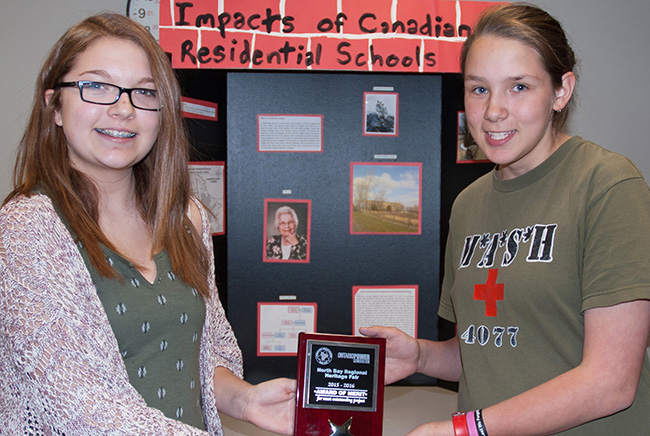Impacts of Indian Residential Schools project wins Heritage Fair

By Kelly Anne Smith
NORTH BAY – “It’s important to know that they were abused and it wasn’t their fault.” Those strong words are from Kaitlyn Restoule of Nipissing First Nation.
Restoule and Emma Starcevic have taken a top award at the North Bay Regional Heritage Fair. Their project, Impacts of Indian Residential Schools, received the OPG Award of Merit for most outstanding project, the top prize in the 2016 North Bay Regional Heritage Fair.
They will be finishing up Grade 8 at St. Luke with a trip to Toronto. They have been invited to represent North Bay at the provincial fair at the University of Toronto June 11-12.
The Chair of the North Bay Regional Heritage Fair, author and professor Nathan Kozuskanich says “Informed citizenship rests on a working knowledge of history. The Heritage Fair encourages students to engage the past and make meaningful connections to the present.”
The students focused on Catherine Couchie Restoule, great-grandmother to Kaitlyn. “The residential school had taken her cultural identity and her personal identity. Catherine was taught Ojibway and the traditions and how to practice the traditions. Yet at the age of six it was all torn apart from her. So now some of them are feeling that it’s their fault. They were abused and traumatized at the school. It’s the government’s fault.”
Teacher Mme King said the students became passionate about their project.
“When I heard them present, it gave me goose bumps. It’s connected. It is a story from Kaitlyn’s past and she is sharing it. Emma has been learning right along with her.”
Starcevic says the biggest impacts for Residential School Students were on the family and the culture. “She was taught not to take part in her culture. They were told it was bad and that God didn’t want them like that. She in turn wasn’t able to teach her kids about the language and culture.”
Restoule added that it was parenting skills that were not taught. “Normally, if you are taught your culture then you teach your kids so they can carry it on for generations more. Catherine was taught that being an Objibway First Nation wasn’t good.”
Kozuskanich, called the project important.
“In the wake of the Truth and Reconciliation Committee’s report, Kailtyn and Emma offered a timely project. The judges were impressed with how they navigated this sensitive topic by considering not only the history of residential schools by also their long-lasting impact in the present.”
Restoule talked about how her great-grandmother Catherine went to residential school at the young age of 5.
“She wasn’t forced. When the Indian agents came to take her and him her siblings, she was close to her older brother Tom, so she said if he was going, she had to go with him. They would have come back for her when she was much older. Age limits were 6 to 16 years.
When they got to Spanish, they realized they would be separated. There was a girl’s school and then a long road, and then a boy`s school.”
Restoule said that Residential Schools started a societal domino effect. “One man came up to us after we made a presentation and asked if the residential schools times are over. I said no. People have been abused emotionally. We must understand the impacts. Then we can fix the problem and move on with reconciliation. It is important to know what people are going through and understand why they are going through it. ”
The history students will continue on their quest researching Residential Schools. Restoule aspires to take after her father, Kevin Restoule, who works for the Union of Ontario Indians. “I want to work helping the victims and survivors of Residential Schools within the Truth and Reconciliation Commission.”
Starcevic says we need to know what happened. “We should know more about it and make people aware so that it will never happen again.”


